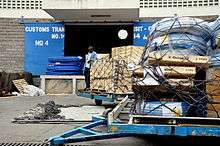Oxfam
Oxfam is a confederation of 20 independent charitable organizations focusing on the alleviation of global poverty, founded in 1942 and led by Oxfam International.[1] It is a major nonprofit group with an extensive collection of operations.
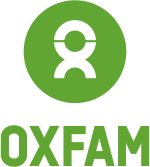 | |
| Named after | Oxford Committee for Famine Relief |
|---|---|
| Founded | 1942 |
| Founded at | Oxford, England |
| Type | International non-governmental organization |
| Focus | Poverty eradication disaster relief advocacy policy research pro-migration |
| Headquarters | Nairobi, Kenya |
Area served | Worldwide |
Director | Winnie Byanyima |
| Website | www |
Winnie Byanyima has been the executive director of Oxfam International from 2013 to 2019.[2]
History
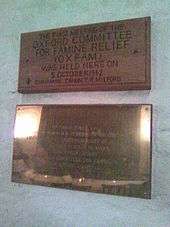
Founded at 17 Broad Street, Oxford, as the Oxford Committee for Famine Relief by a group of Quakers, social activists, and Oxford academics in 1942 and registered in accordance with UK law in 1943, the original Oxford Committee for Famine Relief was a group of concerned citizens including Henry Gillett (a prominent local Quaker), Theodore Richard Milford, Gilbert Murray and his wife Mary, Cecil Jackson-Cole and Alan Pim. The Committee met in the Old Library of University Church of St Mary the Virgin, Oxford, for the first time in 1942, and its aim was to help starving citizens of occupied Greece, a famine caused by the Axis occupation of Greece and Allied naval blockades and to persuade the British government to allow food relief through the blockade. The Oxford committee was one of several local committees formed in support of the National Famine Relief Committee.[3]
Oxfam's first paid employee was Joe Mitty, who began working at the Oxfam shop on Broad Street, Oxford on 9 November 1949. Engaged to manage the accounts and distribute donated clothing, he originated the policy of selling anything which people were willing to donate, and developed the shop into a national chain.[4]
By 1960, it was a major international non-governmental aid organization. The first overseas committee was founded in Canada in 1963, and in 1965 the organization changed its name to its telegraphic address, OXFAM. The Oxford committee became known as Oxfam Great Britain or Oxfam GB. In 1995 Oxfam International was formed by a group of independent non-governmental organizations. Their aim was to work together for a greater impact on the international stage to reduce poverty and injustice. Stichting Oxfam International was registered as a non-profit foundation at The Hague, Netherlands in 1996.[5]
Oxfam's work
Mission and values
In November 2000, Oxfam adopted the rights-based approach as the framework for all the work of the Confederation and its partners. Oxfam recognizes the universality and indivisibility of human rights and has adopted these overarching aims to express these rights in practical terms:
- the right to a sustainable livelihood
- the right to basic social services
- the right to life and security
- the right to be heard
- the right to an identity[6]
Oxfam believes that poverty and powerlessness are avoidable and can be eradicated by human action and political will. It believes in the right to a sustainable livelihood, and the right and capacity to participate in societies and make positive changes to people's lives as basic human needs and rights which can be met. Oxfam believes that peace and substantial arms reduction are essential conditions for development and that inequalities can be significantly reduced between both rich and poor nations and within nations. Oxfam has restructured their donation process and supporter-facing digital in response to a fall in fundraising.[7]
Focus
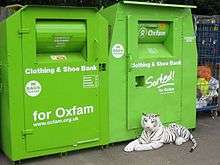
Oxfam works on trade justice, fair trade, education, debt and aid, livelihoods, health, HIV/AIDS, gender equality, conflict (campaigning for an international arms trade treaty) and natural disasters, democracy and human rights, and climate change. Through programmes like "Saving for Change", Oxfam helps communities become more self-sufficient financially. The Saving for Change initiative is a programme whereby communities are taught how to form collective, informal credit groups. Through these mutually beneficial groups, members—who tend to be mostly women—pool their savings into a fund which is used to give loans for activities such as paying for medical care and paying school fees, in addition to using the loans to fund small-scale business ventures. Ultimately, the goal of the programme is to leave the community with a self-sustaining organization where people who otherwise would not qualify for formal bank loans can go for financial assistance. In doing so, borrowers can start businesses which benefit not only themselves but also their communities.[8]
Oxfam has provided relief services during various global crises, including the Israeli–Palestinian conflict, North Korean famine, 2011 East Africa drought, 2012 Sahel drought, Nepal earthquake[9] and Yemeni crisis.[10] The Bosfam NGO was also founded in May 1995 by women participating in an Oxfam GB psycho-social 'radionice' project to support internally displaced women during the Bosnian war. Oxfam has become a globally recognized leader in providing water sanitation to impoverished and war-torn areas the world over. In 2012, Oxfam became one of the humanitarian groups that comprise the UK's Rapid Response Facility to ensure clean water in the wake of humanitarian disasters.[11]
A January 2014 Oxfam report stated that the 85 wealthiest individuals in the world have a combined wealth equal to that of the bottom 50% of the world's population, or about 3.5 billion people.[12][13][14][15][16] More recently, in January 2015, Oxfam reported that the wealthiest 1 percent will own more than half of the global wealth by 2016.[17] A 2017-released Oxfam report has stated that 8 billionaires possess the same amount of wealth as the poorest half of humanity.[18][19][20][21]
Campaigns
The Make Trade Fair campaign organized by Oxfam International focuses on the elimination of trade practices, like dumping, which occurs when highly subsidized, surplus commodities from developed countries such as rice, cotton, corn, and sugar are sold at low prices and farmers from poor countries have difficulty competing.[22] Another practice Oxfams opposes is the setting of tariffs, where nations enforce high taxes on imported goods, restricting the sales of products from other nations,[23] unbalanced labour rights for women, who often earn lower wages than their male counterparts,[24] and stringent patent issues that prevent the prices of medication, software, and textbooks (e.g. Gene patents, Chemical patents, and Software patents) from being lowered. Thus, such essential goods are often inaccessible to developing nations.[25]
Shops
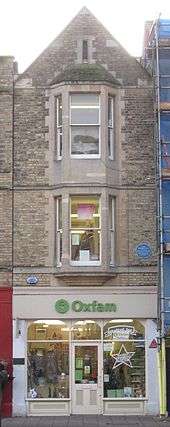
Oxfam has shops all over the world, which sell many fair-trade and donated items since their first charity shop opened in 1948,[26] although trading began in 1947. The proceeds from these are used to further Oxfam's mission and relief efforts around the globe. Much of their stock comes from public donations but as of 2012 they still sold fair trade products from developing countries in Africa, Asia and South America, including handcrafts, books, music CDs and instruments, clothing, toys, food and ethnic creations. These objects are brought to the public through fair trade to help boost the quality of life of their producers and surrounding communities.[27]
As of 2010, Oxfam had over 1,200 shops worldwide.[28] More than half of them were in the UK with around 750 Oxfam GB shops including specialist shops such as books, music, furniture and bridal wear. Oxfam Germany has 45 shops including specialist book shops; Oxfam France shops sell books and fair trade products and Oxfam Hong Kong has 2 shops selling donated goods and fair trade products. Oxfam Novib, Oxfam Australia (with over 20 fair trade shops), Oxfam Ireland and Oxfam in Belgium also raise funds from shops.
Of the 750 Oxfam charity shops around the UK, around 100 are specialist bookshops or book and music shops. Oxfam is the largest retailer of second-hand books in Europe, selling around 12 million per year. In 2008, Oxfam GB worked with over 20,000 volunteers in shops across the UK, raising £17.1 million for Oxfam's programme work.[29]
Fundraising
Oxfam has several successful fundraising channels in addition to its shops. Over half a million people in the UK make a regular financial contribution to its work. In April 2017 the Information Commissioner's Office fined 11 charities that breached the Data Protection Act by misusing donors' personal data. Oxfam was fined £6,000.[30]
Offices and affiliates
Oxfam International
.jpg)
The Oxfam International Secretariat (OIS) leads, facilitates, and supports collaboration between the Oxfam affiliates to increase Oxfam's impact on poverty and injustice through advocacy campaigns, development programmes and emergency response. The OIS Board comprises the Executive Director, Chair of each Affiliate, and the OI Chair. The Affiliates' Chairs are voting members and are non-remunerated. The Executive Directors and the OI Chair are all non-voting-members. The Board also elects the Deputy Chair and Treasurer from among its voting members. The Board is responsible for ensuring that Oxfam International is accountable, transparent, and fit for purpose. The constitution and Strategic Plan are also approved at the Board level. The Board takes recommendations from Executive Directors and ensures that the Confederation is working to its agreed aims. The Board also agrees membership of the Confederation, selects the Honorary President, the Honorary Advisor, the Board Officers and the OI Executive Director. A number of subcommittees with expert members are also mandated by the Board to assist with specific issues. Oxfam International's official languages are English, French and Spanish; English is the working language.[31] In 2009–10 it had approximately 77 staff (including secondment placements and temporary staff e.g. for maternity cover). It is funded by contributions from affiliate organizations and has an operating budget of US$8.7M.[32]
Oxfam America
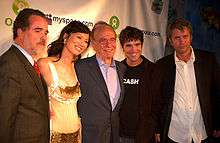
In 1970, Oxfam America became an independent nonprofit organization and an Oxfam affiliate in response to the humanitarian crisis created by the fight for independence in Bangladesh. Oxfam America's headquarters are located in Boston, Massachusetts with a policy and campaigns office in Washington, D.C. and seven regional offices around the world. A registered 501(c)3 organization, Oxfam America campaigns for climate change adaptation, food security, aid reform, access to medicines, and fair trade. Ray Offenheiser served as the president and CEO of Oxfam America from 1996 until 2016.[33] As of 2017, the president and CEO is Abby Maxman.[34][35]
Oxfam Australia
Oxfam Australia is an independent, not-for-profit, secular, community-based aid and development organization, and an affiliate of Oxfam International. Oxfam Australia's work includes long-term development projects, responding to emergencies and campaigning to improve the lives of disadvantaged people around the world. They aim to give disadvantaged people improved access to social services, an effective voice in decisions, equal rights and status, and safety from conflict and disaster. Oxfam Australia's activities are mainly funded by community donation.[36]
Oxfam in Belgium
Oxfam in Belgium is a co-ordinating body of the Belgian components of the Oxfam movement, namely, Oxfam Solidarity, Oxfam Fair Trade, Magasins du Monde Oxfam and Oxfam Wereldwinkels. Oxfam Solidarity incorporates the activities of Oxfam Belgium (founded in 1964) and those of Oxfam Projects (created in 1976). Oxfam Solidarity supports approximately 200 projects and programmes in the South totaling around 10 million Euro, thanks to co-financing by the Belgian government and the European Union. The income of the organization comes from second-hand activities, from the support of donors and as a result of campaigns. Oxfam Wereldwinkels (founded in 1971) and Magasins du Monde-Oxfam (founded in 1975) remain autonomous organizations, focusing on fair trade. With more than 220 outlets, as many groups and 7000 volunteers, they form a movement which, guided by the principles of fair trade, pursues objectives similar to those of Oxfam Solidarity.
Oxfam Canada
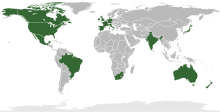
Oxfam Canada is a founding member of Oxfam. It traces its history to 1963 when the British-based Oxford Committee for Famine Relief sought to establish a Canadian branch. Oxfam Canada was independently incorporated in 1966; the first Board of Directors included 21 distinguished Canadians. In 1967, Oxfam Canada became a key organizer of the successful Miles for Millions fundraising walks across the country; Lester Pearson (then Canadian Prime Minister) led Oxfam's first Miles for Millions March. With its revenues, Oxfam began to provide educational materials to schools and undertake advocacy work in public policy development. In 1973, Oxfam-Québec became an independent member of the international Oxfam movement.[37]
Oxfam IBIS (Denmark)
IBIS was founded as an independent organization in 1991, but has its roots in the Danish department of World University Service and has been active since the 1966 (initially mainly against apartheid and similar situations in other southern African nations).[38][39] Since the 1970s, it mainly worked with projects in Africa and Latin America, and usually focused on democracy, education and the causes of poverty.[38][40] In 2014 IBIS became an observer member of Oxfam and in October 2016 it became a full member.[40][41] Around the same time, the name was modified from IBIS to Oxfam IBIS.[39][41]
Oxfam France
Oxfam France was founded in 1988 under the name "Agir ici pour un monde solidaire" (Act here for a unified world). Its work was already based on campaign and advocacy, both of which were rare in France at the time. Agir ici became an observer member of Oxfam in 2003, and a fully-fledged member in 2006.[42] Based in Paris, Oxfam France claims its missions are to inform, increase public awareness & mobilize citizens. Oxfam France's work in advocacy and research focuses on Economic Justice (especially tax revenue in developing countries, ODA, tax heavens and innovative financing), Agriculture (speculation and food prizes, biofuels, land grabbing, trade rules), protecting civilians, and health. Oxfam France is funded mostly by public donations and by institutional donors.[43] It has five second-hand shops:[44] three bookshops (two in Paris, one in Lille), a clothes shop in Lille and a shop in Strasbourg.
Oxfam Germany
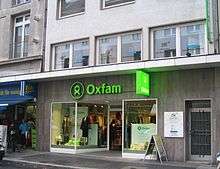
Oxfam Germany has its beginnings in an initiative by private citizens who in 1986 opened a secondhand shop in Bonn modelled on the idea of the British charity shops. While not officially associated with Oxfam, the shop was staffed by volunteers and sold donated goods, with all proceeds given to projects run by Oxfam GB. A second shop, following the same model, was opened in Cologne in 1991.[45] Oxfam officially came to Germany in 1995 with the foundation of the charitable Oxfam Deutschland e. V. and its commercial subsidiary Oxfam Deutschland Shops GmbH. Oxfam Germany became a full affiliate of Oxfam International in 2003.[46] As of February 2017, Oxfam was operating 52 charity shops in 34 German cities,[47] including five Oxfam bookshops and three fashion boutiques. According to the Oxfam Germany website, there are 2,400 volunteers in those shops.[48]
Oxfam GB (Great Britain)
Oxfam GB's headquarters are in Cowley, Oxford. The finance office is in Newcastle, from where Oxfam shops are managed.[49] Oxfam GB had a total income of £408.6m in 2016/17, had 5,000 employees, and used the services of 23,000 volunteers.[50][51] In 2016 it received £31.7m from the British government.[52] Mark Goldring was the chief executive officer from 2013 until January 2019, when he was replaced by Dr Dhananjayan (Danny) Sriskandarajah.[53] In 2017 Oxfam GB advocated an increased migration to the UK through family reunification in recommendations to the government, suggesting that legal aid should cover family-reunification issues.[54]
Oxfam Hong Kong
Oxfam Hong Kong began in 1976, when volunteers came together, opened a second-hand shop, and raised funds for anti-poverty projects around the world. Some of the first actions in the 1970s and '80s were to advocate for justice in the Vietnamese Boat People/Refugee crisis in Hong Kong, and to help save lives in Ethiopia during the 1984 famine. To date, Oxfam Hong Kong has assisted poor people in more than 70 countries/states around the world.[55]
Oxfam India
Oxfam's involvement in India began when money was granted in 1951 to fight famine in Bihar. Bihar at the time was one of the poorest and most populated states in India.
Oxfam had launched an appeal that led to the first report of Oxfam's work in the House of Commons in UK. On 31 May 1951, Secretary of State for Commonwealth Relations had commended the Bihar appeal, stating "the Oxford Committee for Famine Relief (then name of Oxfam) has made an appeal for donations and I hope individuals will reply to that generously". Among the many donations received was one for 100 British pounds from an Indian Rajah in appreciation of what Oxfam was doing for the hungry of his country.[56]
Bihar and famine would bring Oxfam back to India in 1965 to address drought due to bad monsoons. Bihar held a population of 53 million, of which 40 million relied on subsistence farming to live.[57] This would compound for India in the future; production of food had not been parallel to its exploding population. It is estimated that, over the course of the droughts and famines, 2,400 tons of milk was bought by Oxfam and at the height of this was feeding over 400,000 starving children and mothers.[58] In 1968 Oxfam's first field director in India, Jim Howard, created the Oxfam Gramdan Action Programme, or OGAP.[58] This was the first joint rural development programme in Oxfam history and the first step to a new 'operational' Oxfam. Oxfam India was established on 1 September 2008 under section 25 of the Companies Act, 1956 as a non-profitable organization with its head office in Delhi and is now a member of Oxfam International Confederation. This was marked by Oxfam's 60th year in India.[59]
Oxfam Ireland
Oxfam Ireland is a registered charity in the Republic of Ireland and Northern Ireland, with headquarters in Dublin and Belfast. Funds are raised via shops, the government and donors. There are 51 shops throughout Ireland selling goods donated by the public. The Irish government allocated over €3.7m to Oxfam work in 2008–2009. Supporters donate regularly via direct debit or to special appeals. Oxfam Ireland is the public title of the two legal bodies registered in the respective jurisdictions as Oxfam Northern Ireland and Oxfam Republic of Ireland. Oxfam Ireland operates coherently on an all-island basis by means of a single management structure and shared membership of associations and councils.
Oxfam Novib (Netherlands)
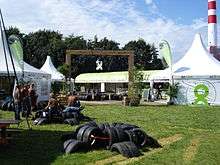
Oxfam Novib is the Dutch affiliate of the international Oxfam organization. The organization is based in The Hague. Oxfam Novib was founded under the name Novib in 1956. Novib, an abbreviation standing for Nederlandse Organisatie Voor Internationale Bijstand (Dutch organization for international aid), was later changed to Nederlandse Organisatie voor Internationale Ontwikkelingssamenwerking (Dutch organization for international development cooperation) due to a change in the approach of the organization's development work. In 1994, Novib became an affiliate of Oxfam and the organization changed its name in 2006 to Oxfam Novib.
Oxfam New Zealand
Oxfam New Zealand[60] is an aid and development organization and affiliate of Oxfam International who conduct humanitarian, development and advocacy work to support positive and lasting change for communities living in poverty.[61] Oxfam NZ is also responsible for delivering Cyclone relief in several countries in the Pacific region.[62] Oxfam New Zealand's work is made possible by supporters, interns, staff, volunteers, board and overseas partners. Most of the staff are based in their Auckland office. They also have a policy unit in Wellington.[63] Most of Oxfam New Zealand's funds come from donations, supplemented by New Zealand government funds.
Criticism
Political neutrality
In 2005, Oxfam Great Britain was criticised by other NGOs for becoming too close to Tony Blair's New Labour government in the UK.[64]
Internal structures and political role
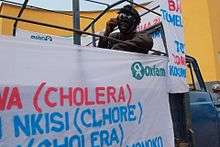
In October 2005, the magazine New Internationalist described Oxfam as a "Big International Non-Government Organisation (BINGO)", having a corporate-style, undemocratic internal structure, and addressing the symptoms rather than the causes of international poverty – especially by acquiescing to neoliberal economics and even taking over roles conventionally filled by national governments.[65] Similar criticism came from Red Pepper magazine in July 2005[66] and Katherine Quarmby in the New Statesman in May 2005.[67] The latter article detailed growing rifts between Oxfam and other organisations within the Make Poverty History movement.
In a 2011 Columbia Journalism Review article, journalist Karen Rothmyer accused NGOs in general and Oxfam in particular of being unduly influenced by the priorities of the media, of providing inaccurate information to the press ("stories featuring aid projects often rely on dubious numbers provided by the organisations") and of perpetuating negative stereotypes which "have the potential to influence policy". She drew on earlier work by journalist Lauren Gelfand, who had taken a year away from journalism to work for Oxfam: "A lot of what Oxfam does is to sustain Oxfam"; and Linda Polman, author of the Crisis Caravan: "Aid organisations are businesses dressed up like Mother Theresa".[68] In 2015, Omaar and de Waal, in Food and Power in Sudan, commented, "the 1990s have seen growing pressure for humanitarian institutions to become more accountable. There has been a succession of reviews of major operations, growing in independence and criticism."[69] They quote an OECD report, "The Joint Evaluation of Emergency Operations in Rwanda", which stated that its team "came across examples of Agencies telling, if not falsehoods, then certainly half-truths" and noted "a remarkable lack of attempts by agencies to seek the views of beneficiaries on the assistance being provided".[70]
Oxfam and others launched the Sphere Project in response, an initiative which aims to "improve the quality of assistance provided to people affected by disasters", to "develop a set of minimum standards in core areas of humanitarian assistance" and to introduce an element of accountability which had previously been lacking.
Conflict with Starbucks on Ethiopian coffee, 2006
On 26 October 2006, Oxfam accused Starbucks of asking the National Coffee Association (NCA) to block a US trademark application from Ethiopia for three of the country's coffee beans, Sidamo, Harar and Yirgacheffe.[71] They claimed this could result in denying Ethiopian coffee farmers potential annual earnings of up to £47m. Ethiopia and Oxfam America urged Starbucks to sign a licensing agreement with Ethiopia to help boost prices paid to farmers. At issue was Starbucks' use of Ethiopia's coffee brands—Sidamo, Yirgacheffe and Harar—that generate high margins for Starbucks and cost consumers a premium, yet generated very low prices to Ethiopian farmers. Robert Nelson, the head of the NCA, added that his organization initiated the opposition for economic reasons, "For the U.S. industry to exist, we must have an economically stable coffee industry in the producing world ... This particular scheme is going to hurt the Ethiopian coffee farmers economically." The NCA claimed the Ethiopian government was being badly advised and this move could price them out of the market.[71]
Facing more than 90,000 letters of concern, Starbucks had placed pamphlets in its stores accusing Oxfam of "misleading behavior" and insisting that its "campaign need[s] to stop". On 7 November, The Economist derided Oxfam's "simplistic" stance and Ethiopia's "economically illiterate" government, arguing that Starbucks' (and Illy's) standards-based approach would ultimately benefit farmers more.[72] In June 2007, Ethiopian Government representatives and senior leaders from Starbucks Coffee Company worked out an agreement regarding distribution, marketing and licensing that recognized the importance and integrity of Ethiopia's specialty coffee designations without disclosing financial terms. Starbucks was set to market Ethiopian coffee during two promotional periods in 2008. An Oxfam spokesman said the deal sounds like a "useful step" as long as farmers are benefiting, and a big step from a year prior when Starbucks "wasn't engaging directly (with) Ethiopians on adding value to their coffee".[73]
Fair trade coffee
On 28 April 2007 an Australian conservative think tank, the Institute of Public Affairs, lodged a complaint with the Australian Competition and Consumer Commission accusing Oxfam of misleading or deceptive conduct under the Trade Practices Act in its promotion of Fairtrade coffee.[74] They claimed that high certification costs and low wages for workers undermine claims that Fairtrade helps to lift producers out of poverty. The complaint was subsequently dismissed by the Commission.[75]
Israeli–Palestinian conflict
In October 2009, Oxfam was accused by Israeli NGO Regavim of aiding Palestinians in illegal activities in Kiryat Arba, including water theft. Oxfam has denied its participation.[76]
Oxfam UK has partnered with the Board of Deputies who represent the Jewish community of the UK. The project, Grow-Tatzmiach, includes sending 25 people to an activist training programme to help fight global hunger. In exchange for partnering, Oxfam has agreed not to "call for a boycott of Israeli goods or to support groups that do so, and will not partner with organizations that advocate violence or oppose a two-state solution to the Israeli–Palestinian conflict". Despite this agreement, there are still those on both sides who object to this project.[77]
In response to a 2012 Oxfam report which laid the blame for poor economic development in the Palestinian territories solely with Israel, a spokesman for the Israel embassy in the UK said, "Oxfam's latest report on the situation in the Palestinian territories puts a clearly political agenda above any humanitarian concern. Far from advancing peace, such an approach undermines the prospects of reaching a negotiated resolution to the conflict."[78]
As of 2013 Oxfam endorsed the two-state solution and wants Israel to lift the blockade of the Gaza Strip and dismantle all of the Israeli settlement infrastructure.[77]
On 17 January 2014 Oxfam UK cancelled an exhibition, "Gaza: Through my Eyes", which had been due to take place at East London Mosque after Left Foot Forward presented information to the charity detailing homophobic and potentially anti-semitic comments by one of the organizers, Ibrahim Hewitt. Human rights campaigner Peter Tatchell was reported as welcoming the event's cancellation but to have said of Oxfam UK, "it is hugely disappointing that it did no proper checks on (Mr. Hewitt) before agreeing his presence."[79]
On 29 January 2014 actress Scarlett Johansson resigned as an international spokeswoman for Oxfam after appearing in a TV ad for SodaStream, a company with presence in the West Bank. Her publicist stated that Johansson "respectfully decided to end her ambassador role with Oxfam after eight years ... She and Oxfam have a fundamental difference of opinion in regards to the boycott, divestment and sanctions movement."[80]
In February 2015, Israeli NGO Regavim released a report stating that the European Union had illegally funded the construction of houses; Oxfam and other NGOs participated in the project. Oxfam defended the construction "on humanitarian grounds."
In March 2020, the ambassador of Israel in the United Kingdom, Mark Regev, protested the selling of antisemitic books on Oxfam website, notably the Protocols of the Elders of Zion. After the protest, the Oxfam GB chief executive apologized and removed the books from sale.[81]
Confrontation with Population Matters
In December 2009 Duncan Green, head of research at Oxfam, attempted to discredit the PopOffsets initiative of Population Matters (formerly known as the Optimum Population Trust), under which individuals can offset their carbon emissions by funding family planning services in the developing world. Green wrote in an op-ed in the New Statesman that assumptions such as those in the OPT report equating population growth and environmental degradation are a "gross oversimplification".[82]
In response, OPT described the response of parts of the development lobby to the initiative as "frankly disgraceful", adding: "The world badly needs a grown-up, rational discussion of the population issue ... without blame, abuse and hysteria."[83]
Bookshops
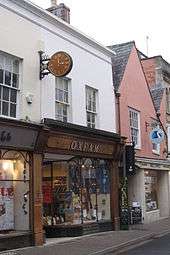
Oxfam has been criticized[84][85] for aggressively expanding its specialist bookshops, using tactics more often associated with multi-national corporations. The charity has been criticized as some claim this expansion has come at the expense of independent secondhand book sellers and other charity shops in many areas of the UK.
Dole
In May 2013 Oxfam demanded Dole remove its 'Ethical Choice' labels from its bananas in New Zealand until it improved treatment of its workers in the Philippines.[86] A Dole spokesperson said Oxfam's report was a "commercial move" aimed at backing a rival supplier which backed Oxfam, and Oxfam was "trying to destroy the Dole brand".
2015 study on net worth inequality
Time Inc. Network wrote a reply to an Oxfam study from January 2015[87] on inequality stating that the richest 1% at the end of 2016 will own more than half of the world's assets. However, Time pointed out that the data were based on a study from Credit Suisse. In this study, The Global Wealth Databook 2015, personal assets were calculated in net worth, meaning wealth would be negated by having any mortgages.[88]
Staff sexual misconduct in Haiti and Chad
In February 2018 an investigation by The Times newspaper found that Oxfam allowed three men to resign and sacked four for gross misconduct after an inquiry concerning sexual exploitation, the downloading of pornography, bullying and intimidation. A 2011 confidential report by Oxfam had found "a culture of impunity" among some staff in Haiti and concluded that 'it cannot be ruled out that any of the prostitutes were under-aged'. Among the staff who were permitted to resign was the charity's Belgian country director, Roland Van Hauwermeiren.[89] In the internal report, Van Hauwermeiren admitted using prostitutes at a villa whose rent was paid for by Oxfam with charitable funds. Oxfam's chief executive at the time, Dame Barbara Stocking, offered Hauwermeiren "a phased and dignified exit" because sacking him risked "potentially serious implications" for the charity's work and reputation.[90]
Oxfam did not report any of the incidents to the Haitian authorities, because "it was extremely unlikely that any action would be taken".[90] Although Oxfam disclosed details of the incident to the Charity Commission, the Commission revealed after The Times investigation that it had never received Oxfam's final investigation report and Oxfam "did not detail the precise allegations, nor did it make any indication of potential sexual crimes involving minors". A spokesperson for the Commission commented that: "We will expect the charity to provide us with the assurance that it has learnt lessons from past incidents".[91] Oxfam later explained it had not given details to the Commission beyond "inappropriate sexual behaviour" because using prostitutes in Haiti was not illegal.[92]
In response to the revelations, Liz Truss, the chief secretary to the Treasury, described the reports as "shocking, sickening and depressing". Oxfam issued a statement in which it asserted "Oxfam treats any allegation of misconduct extremely seriously. As soon as we became aware of a range of allegations – including of sexual misconduct – in Haiti in 2011 we launched an internal investigation. The investigation was announced publicly and staff members were suspended pending the outcome". The statement also added that the allegations "that under-age girls may have been involved were not proven".[90] Speaking on the BBC's Andrew Marr Show, the international development secretary, Penny Mordaunt, said Oxfam had failed in its "moral leadership" over the "scandal". Mordaunt also said that Oxfam did "absolutely the wrong thing" by not reporting the detail of the allegations to the government.[93] The incident led the International Development Committee of the UK Parliament to issue a report about sexual harassment and abuse in the humanitarian sector on 31 July 2018.
Oxfam had been aware that Van Hauwermeiren while director of Oxfam's relief operation in Chad in 2006 and other staff had repeatedly used prostitutes at the Oxfam team house there, and that one of Oxfam's staff members had been fired for his behaviour.[94][95] Oxfam's deputy chief executive Penny Lawrence resigned, taking full responsibility and acknowledging that "(c)oncerns were raised about the behaviour of staff in Chad as well as Haiti that we failed to adequately act upon".[95] New allegations were made by a senior staffer, Helen Evans, who had been the lead investigator of organizational sexual misconduct between 2012 and 2015.[96] A commentator in the medical journal Lancet argued the Oxfam sex scandal was not surprising.[97]
Awards and nominations
In January 2013, Oxfam was nominated for the Charity of the Year award at the British Muslim Awards.[98]
See also
- 2007–08 world food price crisis
- Global Hunger Index
- Integrated Food Security Phase Classification
- Millennium Development Goals (Goal 1)
- Make Trade Fair
- Ox-Tales
- Universal Declaration on the Eradication of Hunger and Malnutrition (1974)
References
- "Oxfam Annual Report and Accounts, 2016/7" (PDF). 2017. p. 8.
- "Winnie Byanyima to serve second 5-year term leading Oxfam International, from Nairobi". Oxfam.org. 4 December 2017.
- Black, (1992)
- "Oxfam shop founder dies aged 88". News. BBC News. 2 October 2007. Retrieved 26 February 2012.
- "Stitching Oxfam International". Companies House.
- "Oxfam International Strategic Plan 2007–2012: Demanding Justice" (PDF). Archived from the original (PDF) on 23 January 2013. Retrieved 21 April 2013.
- "Oxfam digital offerings combat fall in fundraising". Charity Digital News. 17 May 2019. Retrieved 5 June 2019.
- Muller, Tjarda (1 October 2010). "A Source of Income, Funded by Savings". America: Oxfam. Archived from the original on 31 October 2013. Retrieved 26 December 2014.
- "Open Sans". Archived from the original on 18 May 2015.
- "Aid agency Oxfam condemns Saudi airstrike in Yemen". Reuters. 20 April 2015.
- "Rapid response: Tackling cholera in Sierra Leone with Oxfam". Department for International Development. Retrieved 2 February 2015.
- "Rigged rules mean economic growth increasingly 'winner takes all' for rich elites all over world". Oxfam. 20 January 2014.
- Neuman, Scott (20 January 2014). "Oxfam: World's Richest 1 Percent Control Half of Global Wealth". NPR. Retrieved 25 January 2014.
- Stout, David (20 January 2014). "One Stat to Destroy Your Faith in Humanity: The World's 85 Richest People Own as Much as the 3.5 Billion Poorest". Time. Retrieved 21 January 2014.
- Wearden, Graeme (20 January 2014). "Oxfam: 85 richest people as wealthy as poorest half of the world". The Guardian. Retrieved 21 January 2014.
- Kristof, Nicholas (22 July 2014). "An Idiot's Guide to Inequality". The New York Times. Retrieved 22 July 2014.
- Cohen, Patricia (19 January 2015). "Richest 1% Likely to Control Half of Global Wealth by 2016, Study Finds". The New York Times. Retrieved 19 January 2015.
- Ratcliff, Anna (16 January 2017). "Just 8 men own same wealth as half the world". Oxfam. Retrieved 16 January 2017.
- Mullany, Gerry (16 January 2017). "World's 8 Richest Have as Much Wealth as Bottom Half of Global Population". New York Times. Retrieved 16 January 2017.
- Elliott, Larry (16 January 2017). "World's eight richest people have same wealth as poorest 50%". The Guardian. Retrieved 16 January 2017.
- Hardoon, Deborah. "An Economy for the 99%: It's time to build a human economy that benefits everyone, not just the privileged few". oxfam.org.uk. Oxfam. Retrieved 16 January 2017.
- "Rigged Rules – Dumping". Archived from the original on 9 February 2006. Retrieved 29 January 2006.
- "Rigged Rules – Market Access". Archived from the original on 21 February 2006. Retrieved 29 January 2006.
- "Rigged Rules – Labour Rights". Archived from the original on 24 December 2005. Retrieved 29 January 2006.
- "Rigged Rules – Patents". Archived from the original on 22 March 2006. Retrieved 29 January 2006.
- "History of Oxfam". Oxfam.
- "Fair Trade Products, Homeware, Gifts & Jewellery from". Shop. AU: Oxfam. Retrieved 16 May 2012.
- Annual Report, Oxfam, November 2010
- "Trustee's Report 2007–08". UK: Oxfam. Archived from the original on 30 January 2009.
- "fines eleven more charities". ICO. 5 April 2017. Retrieved 13 November 2017.
- "Stichting Oxfam International Rules of Procedure as amended on 4 October 2012" (PDF). Archived from the original (PDF) on 14 March 2016. Retrieved 20 January 2015.
- "Wealth: Having It All and Wanting More" (PDF). Oxfam. January 2015. pp. 1–12. Retrieved 20 January 2015.
- Fallon, Joan (21 November 2016). "Ray Offenheiser to join Notre Dame faculty as Distinguished Professor of the Practice in the Keough School of Global Affairs". University of Notre Dame. Retrieved 21 September 2017.
- "Abby Maxman". Oxfam America. oxfamamerica.org. Retrieved 21 September 2017.
- Maxman, Abby (5 July 2017). "Aid to Africa" (letter to the editor). New York Times. nytimes.com. Retrieved 21 September 2017.
- Blackburn, (1993)
- "Introduction to Oxfam". Retrieved 4 August 2015.
- "Historien kort" (in Danish). Oxfam IBIS.
- "IBIS hedder nu Oxfam IBIS" (in Danish). Globalnyt.
- "Ibis om Oxfam-medlemskab: Vi kommer ikke til at druknet" (in Danish). altinget.dk.
- "Vejen til medlemskab af Oxfam" (in Danish). Oxfam IBIS.
- "Qui sommes-nous?" (history). Oxfam France. Archived from the original on 7 November 2013.
- "Nos Finances" (Finances). Oxfam France. Archived from the original on 6 November 2013.
- "Nos Adresses" (Shops). Oxfam France. Archived from the original on 4 April 2013.
- "Make Trade Fair" (history). Oxfam Germany. Archived from the original on 14 March 2012.
- "Über uns" [About us] (in German). DE: Oxfam. 10 June 2015.
- "Shop-Finder" (in German). DE: Oxfam. 25 August 2015.
- "GmbH" (in German). DE: Oxfam. 3 February 2010.
- "Archived copy". Archived from the original on 16 November 2015. Retrieved 22 March 2016.CS1 maint: archived copy as title (link)
- Oxfam GB Annual Report 2017, pp. 31, 54.
- Elgot, Jessica (11 February 2018). "Oxfam told to show 'moral leadership' or lose government funds". The Guardian.
- "Reality Check: How much UK charity money goes to Oxfam?". BBC News. 12 February 2018.
- "Oxfam's CEO, Directors and Trustees". Oxfam.org.uk.
- Brexit and the refugee crisis (PDF). Oxfam GB. 2017. p. 6.
- "Oxfam Hong Kong – About Us". Retrieved 20 September 2013.
- The Oxfam Story, page 11, Pergamon Press Ltd (1964) Library of Congress Card No. 64-17726
- Black 1992.
- Drops in the ocean: the work of Oxfam 1960–1970. London: Macdonald & Co. 1970. ISBN 0-356-03568-9.
- "About". IN: Oxfam.
- "Home".
- "Oxfam Trailwalker in New Zealand". www.runningcalendar.co.nz. Retrieved 13 November 2015.
- "Improving disaster relief in the Pacific with Oxfam New Zealand | Deloitte New Zealand | Corporate responsibility". Deloitte New Zealand. Archived from the original on 17 November 2015. Retrieved 13 November 2015.
- "Who we are – about our people". Oxfam New Zealand. 13 June 2012. Retrieved 13 November 2015.
- Quarmby, Katharine (30 May 2005). "Why Oxfam Is Failing Africa". New Statesman.
- "The Big Charity Bonanza". New Internationalist (keynote). 1 October 2005.
- "The New Scramble for Africa", Red Pepper, July 2005
- Quarmby, Katherine (30 May 2005), "How Oxfam is Failing Africa", New Statesman
- Rothmyer, Karen (March–April 2011). "Hiding the Real Africa; Why NGOs Prefer Bad News". Columbia Journalism Review.
- Omaar; de Waal (1997). Food and Power in the Sudan: A Critique of Humanitarianism. African Rights. ISBN 978-1-899477-13-5.
- The Joint Evaluation of Emergency Operations in Rwanda, OECD, 1994
- "Starbucks in Ethiopia coffee row". BBC News. UK. 26 October 2006. Retrieved 2 November 2009.
- "Oxfam versus Starbucks: And this time, Oxfam may be wrong". The Economist. 7 November 2006. Retrieved 2 November 2009. (subscription required)
- Craig Harris (28 November 2007). "Starbucks chairman, Ethiopia talk beans". Seattle PI. Retrieved 20 March 2015.
- Overington, Caroline (28 April 2007). "Oxfam coffee 'harms' poor farmers". The Australian. News Limited. Retrieved 15 September 2010.
- Xuereb, Mario (28 June 2007). "Not free, but fair: Oxfam cleared of coffee chicanery". The Age. AU. Retrieved 2 November 2009.
- Lazaroff, Tovah; Lappin, Yaakov (31 October 2009). "NGO: Oxfam aids illegal Palestinian deeds". The Jerusalem Post. Retrieved 30 March 2015.
- "Oxfam agrees to conditions on Israel set by UK Jewry". The Times of Israel. Retrieved 2 February 2015.
- "Israeli settlements 'jeopardising' Palestinian prosperity". BBC News. Retrieved 2 February 2015.
- Bloodworth, James (15 January 2014). "Left Foot Forward forces Oxfam climbdown over speaker's homophobic comments". Left Foot Forward. Retrieved 16 January 2014.
- "Scarlett Johansson quits Oxfam role over SodaStream row". BBC News. 30 January 2014. Retrieved 30 January 2014.
- "Oxfam removes antisemitic books from sale after Israel's UK ambassador tweets condemnation". 13 March 2020.
- Duncan Green (10 December 2009). "Blaming the victims: Does climate change require women in poor countries to stop 'popping them out'?". New Statesman. Retrieved 30 March 2015.
- "Development lobby "disgrace" on population" (Press release). Optimum population. 9 December 2009. Archived from the original on 9 July 2010.
- Victoria Gallagher (10 February 2010). "Indie booksellers concerned by latest Oxfam Bookshop". The Bookseller. Retrieved 30 March 2015.
- Hill, Susan. "Bullying is bullying – whoever does it". The Spectator. UK. Archived from the original on 14 February 2010.
- "Dole bananas not ethical – Oxfam". 3 News NZ. 28 May 2013. Archived from the original on 21 February 2014. Retrieved 28 May 2013.
- "Richest 1% will own more than all the rest by 2016 – Oxfam International". Oxfam. 19 January 2015.
- "Yes, Oxfam, the Richest 1% Have Most of the Wealth. But That Means Less Than You Think". Time.
- "Oxfam Haiti allegations: How the scandal unfolded". BBC. 21 February 2018. Retrieved 21 March 2018.
Among the male staff accused of sexual misconduct is Oxfam's then-director of operations in Haiti, Roland Van Hauwermeiren. He is alleged to have used prostitutes at a villa rented for him by the charity.
- Chief Reporter, Sean O’Neill (9 February 2018). "Minister orders Oxfam to hand over files on Haiti prostitute scandal". The Times. ISSN 0140-0460. Retrieved 9 February 2018.
- "Oxfam denies 'Haiti prostitute' cover-up". BBC News. 9 February 2018. Retrieved 9 February 2018.
- Hope, Christopher (4 July 2018). "Oxfam did not tell regulator about use of prostitutes in Haiti because it was not illegal, says Barbara Stocking". Daily Telegraph. Retrieved 5 July 2018.
- "Oxfam 'failed in moral leadership'". BBC News. 11 February 2018. Retrieved 11 February 2018.
- Ratcliffe, Rebecca; Quinn, Ben (11 February 2018). "Oxfam: fresh claims that staff used prostitutes in Chad". The Observer.
- "Oxfam: Deputy resigns over sex claims amid crisis talks". BBC News. 12 February 2018.
- Smout, Alistair. (13 February 2018). "UK's Oxfam hit by new report of sex abuse by aid workers." Reuters website Retrieved 13 February 2018.
- Mishal S Khan. sex scandal or governance failure? The Lancet. 23 February 2018
- "Winners honoured at British Muslim Awards". Asian Image. 31 January 2013. Retrieved 1 November 2015.
Further reading
- Berry, Craig, and Clive Gabay. "Transnational political action and 'global civil society' in practice: the case of Oxfam." Global Networks 9.3 (2009): 339–358. [ online]
- Black, Maggie (1992). A Cause for Our Times: Oxfam the First 50 Years. Oxford UP. ISBN 0-85598-173-3..
- Blackburn, Susan (1993). Practical Visionaries: A Study of Community Aid Abroad. Melbourne University Press. ISBN 0-522-84562-2..
- Crewe, Emma. "Flagships and tumbleweed: A history of the politics of gender justice work in Oxfam GB 1986–2015." Progress in Development Studies 18.2 (2018): 110-125.
- Eadie, Deborah and Suzanne Williams, ed. The Oxfam Handbook of Development and Relief (2 vol. 1995).
- Gill, Peter. Drops in the ocean: the work of Oxfam 1960–1970 (1970).
- Hajnal, Peter I. "Oxfam International." in Peter I. Hajnal, ed. Civil society in the information age (Routledge, 2018). 57–66.
- Hilton, Matthew. "Oxfam and the Problem of NGO Aid Appraisal in the 1960s." Humanity: An International Journal of Human Rights, Humanitarianism, and Development 9.1 (2018): 1–18. abstract
Archival sources
- Oxfam Canada fonds at Library and Archives Canada.[1][2] Archival reference number, R2972. Former archival reference number, MG28-I270. Date range: 1958-1985. Extent: 17.855 meters of textual records; 873 photographs; 1 audio disc; 14 blueprints & maps.
External links
| Wikimedia Commons has media related to Oxfam. |
- "Finding aid to the Oxfam Canada fonds at Library and Archives Canada" (PDF). Retrieved 18 June 2020.
- "Oxfam Canada fond description at Library and Archives Canada". Retrieved 18 June 2020.
